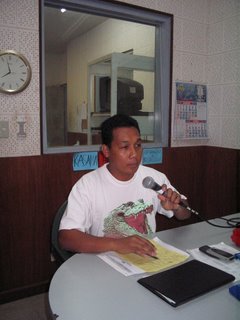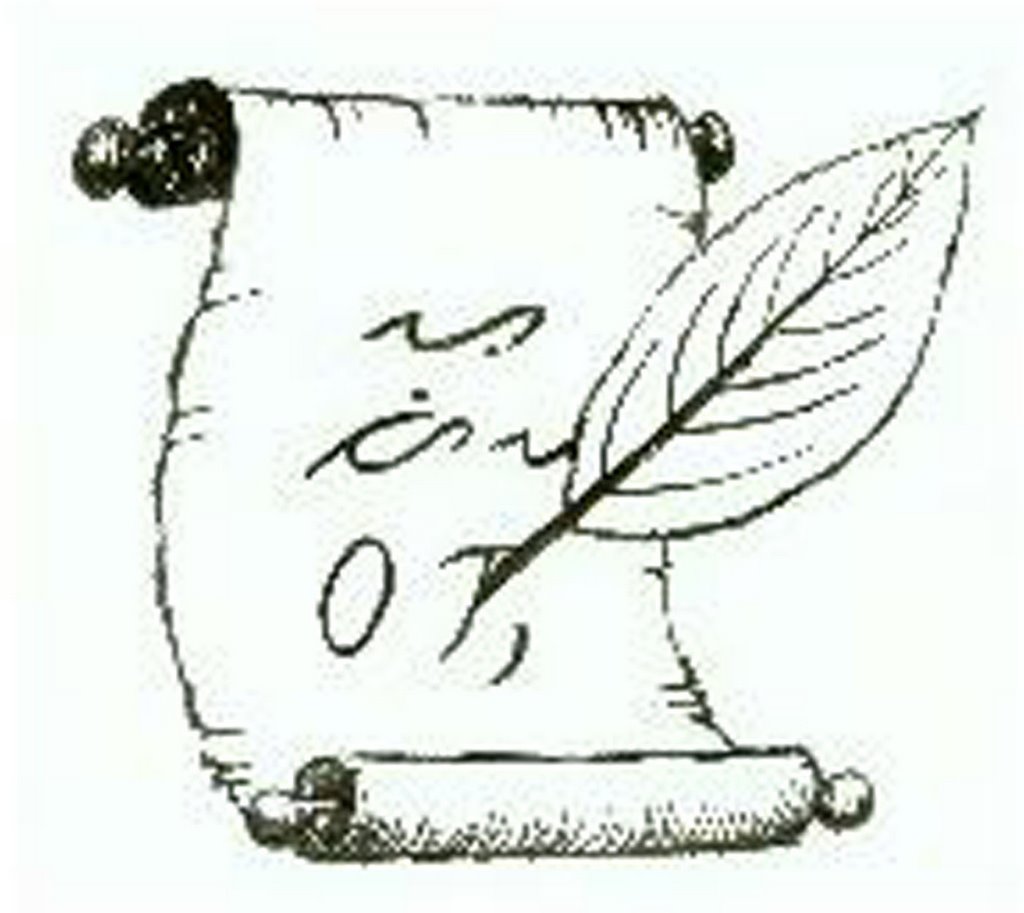Who is the mastermind?

Arrest of suspect fails to ease doubts on Batul murder
PRESSURE IS MOUNTING on law enforcers to identify the brains behind the brutal killing of radio journalist Fernando “Dong” Batul last week, with the first suspect they arrested denying any involvement in the crime.
PRESSURE IS MOUNTING on law enforcers to identify the brains behind the brutal killing of radio journalist Fernando “Dong” Batul last week, with the first suspect they arrested denying any involvement in the crime.
Murder charges were filed against Police Officer Aaron Golifardo last May 25 after four eyewitnesses identified him as one of two gunmen who shot Batul at close range, killing him instantly, according to Col. Elpidio de Asis, Provincial Director of the Philippine National Police (PNP) in Palawan and head of Task Force Batul.
The case was assigned to the Regional Trial Court Branch 51 under Judge Chito Meregillano.
Two other suspects, another gunman and a lookout, are still at large.
A member of the 413rd Regional Mobile Group assigned with the Philippine National Police – Palawan, Golifardo was arrested in Manila and flown back to Puerto Princesa three days after Batul was killed.
“Wala akong alam sa pangyayaring iyan. Wala akong alam diyan,” he asserted in a brief ambush interview with DYPR upon his arrival, in handcuffs, at the city airport.
Widely known as the most popular broadcaster in Palawan, Batul was on his way to his morning radio program “Bastonero” on DYPR when he was ambushed and gunned down just a hundred meters from the station last May 22.
National Bureau of Investigation-Palawan director Atty. Onos Mangotara said all the four witnesses, who were at the scene of the crime, positively identified Golifardo as one of the gunmen during the inquest at the City Prosecutor’s Office on May 25. One of the witnesses knew Golifardo personally, he added.
However, Golifardo’s family maintained that he was at home preparing for his flight to Manila at the time of the incident. One of his neighbors also told DYPR the suspect had gone to the latter’s house to have his mobile phone charged, as he had a travel order from May 22 to 28 to go to the national police headquarters on official business.
Golifardo was supposed to be presented at a news conference shortly after his arrival, but only members of the Task Force appeared before the media. In response to doubts about the gunman’s identity, PNP Directorate chief Isidro Lapeña said: “There is no fall guy in the case.” He added that the Task Force would continue the investigation.
During the inquest, Golifardo was allowed to speak with the media briefly, and he reiterated his innocence. He tearfully expressed his condolences to Batul’s family, and firmly denied any involvement in the crime.
Letty Batul-Cabusao, the victim’s older sister, said they welcomed the arrest but expressed hope that the brains behind the killing would also be identified.
“Sana hindi dito magtapos. Sana ang hustisya ay makamit ng aking kapatid,” she said.
Batul had criticized Golifardo in his program on May 11, about two weeks before the killing, after a bar owner complained that the policeman poked a gun at one of her waitresses when the latter refused to be kissed.
Edwin Gastanes, a legal counsel for the Batul family, said the arrest was a “positive development” and the statement from the Task Force that the investigation would continue gave them hope that the case would be resolved.
Former mayor Dennis Socrates, the running mate of Batul when the latter was elected vice mayor in 2001, said the possible motive of the suspect and other accomplices in the crime would need to be identified. The investigation “should go beyond personal scuffle,” he added.
Batul had incurred the ire of many government officials, rival broadcasters, and military officers due to his fearless discussion of anomalies and human rights abuses in his radio program.
Last April 24, less than a month before he was killed, two grenades were hurled into his family’s residence in Barangay San Manuel but these failed to explode and were safely detonated. In a note written in red ink, the attackers warned Batul of dire consequences if he did not stop talking about controversial issues in his program.
Just before that incident, Batul had tackled the complaints of migrant workers from Palawan who had paid P50,000 each to secure contracts for Taiwan through the public employment service office (PESO) of the city government. They had ended up in menial jobs instead of the employment specified in their contracts, and the agency said they did not collect any placement fee for the workers.
Assault on the “Masa”
Widespread condemnation of Batul’s assassination poured in from various sectors in Palawan and the national media.
Widespread condemnation of Batul’s assassination poured in from various sectors in Palawan and the national media.
“We call on the proper authorities to solve as soon as possible this heinous crime and give justice to the aggrieved parties,” said Bishop Pedro Arigo, the Apostolic Vicar of Puerto Princesa.
“Observing the pattern and the growing number of victims, there seems to be a grand sinister devilish plot to silence media men made of stuff like Dong’s and to scare others from exposing the truth and fighting corruption. And we wonder: when will the killings stop?” Bishop Arigo said.
“It was an assault on all peace loving Palaweños, specially on the ‘masa’ Dong was helping during his radio programs. The common folk made recourse to his program to air their grievances and concerns,” the prelate noted.
Batul would have turned 37 last May 24, but instead of a birthday celebration, his friends and family could only reminisce about his crusade as a journalist and experience as a former vice mayor of Puerto Princesa.
“Birthday mo ngayon, hindi ako masaya,” said his mother Condrada Batul, a former store owner in the public market. She had often warned her youngest son to tone down his hard-hitting comments on radio, but she said: “Ayaw niyang makinig sa akin.”
Gerry Ortega, his mentor at the Crocodile Farming Institute where Batul was an information officer, agreed that he had a stubborn streak and was fiercely independent.
“Walang may hawak ng utak ni Dong,” Ortega said. “He told me face to face six months ago that he has already conquered the fear of death.”
Jimmy Cañete, a close-in bodyguard of Batul when he was vice mayor, said that unlike most politicians, the latter had refused to carry firearms in his car.
“Daliri lang ang dala namin. Wala kaming mga armas. Sabi ko, ako ba kasama sa magpapakamatay? Sinabi niya sa akin na ang armas natin, ang Diyos na tumitingin sa atin,” he said during a Luksang Parangal on Batul’s birthday, two days after the killing.
Principled Critic
“We deeply mourn the loss of a highly principled and credible broadcast journalist, a fearless and untiring advocate of good governance, a true servant of the public, and a valuable partner in the quest for social justice and genuine social development,” the Palawan NGO Network Inc. said in a statement.
“We deeply mourn the loss of a highly principled and credible broadcast journalist, a fearless and untiring advocate of good governance, a true servant of the public, and a valuable partner in the quest for social justice and genuine social development,” the Palawan NGO Network Inc. said in a statement.
“We call on all Palaweños to uphold the legacy of Mr. Batul by expressing their disgust on this detestable crime, and by perpetuating his fight for truth, justice and decency in public service,” they added.
Rep. Antonio Alvarez also joined other Palawan officials in condemining the killing, saying: “Malaking dagok ito sa freedom of the press hindi lamang sa ating lalawigan kundi sa buong bansa na ang isang katulad ni Batul na may mataas na kredibilidad at iginagalang dahil sa kanyang mga prinsipyo at determinadong paglalahad ng mga anomalya sa pamahalaan at lipunan ay brutal at walang-awang pina-tahimik sa pamamagitan ng baril.”
He praised the Task Force for quickly arresting one of the suspects, and stressed the importance of solving the case soon to avoid public speculation regarding the possible involvement of other “personalities” in the crime.
In a rare move, the Rotary Club of Puerto Princesa and Palawan Chamber of Commerce and Industry issued a joint statement condemning the killing of Batul.
“There could never be any acceptable justification in the treacherous and cowardly murder of anyone in an otherwise peaceful community such as ours,” the influential business and civic groups said. “May the vigilance of the citizenry and the renewed effort of law enforcement not only bring justice but may it likewise set our community free from violence and all acts of criminality.
The Palawan Community Media Council expressed concern about the threat to press freedom engendered by the killing.
“Dong Batul was a principled critic of known personalities in Puerto Princesa and fearlessly used the airwaves to defend decency in the political life of Palawan.,” the PCMC said.
“He was the voice of dissent in a climate of apparent indifference on the part of many Palaweños who may have shared his views in changing society but whose main concern was to eke out a living and survive the economic hardship brought about by uncertain times,” the PCMC statement said.
“That he was violently killed by assassins bent on silencing him permanently does not bode well for critical and credible discussion of problems of the community.”
The National Union for Journalists in the Philippines (NUJP) sent a representative to Puerto Princesa to find out the circumstance behind the killing and provide financial assistance to Batul’s family.
In a statement issued on the day of the murder, the NUJP criticized President Arroyo for downplaying the spate of murders of media people in the country.
“The Arroyo government may argue until it is blue in the face that a culture of impunity does not exist in the country,” the NUJP said. “It should tell that to the family of Palawan broadcaster Fernando ‘Dong’ Batul.”
“Today, we call on all our colleagues to fight back. Let us cease to be just observers and recorders to the death of democracy,” the group exhorted the country’s media people.
“United, we can fight back the threats to our lives and liberties with the weapon we know best how to use – our profession, our pens, our cameras, our microphones,” the NUJP statement concluded.
- reported by the Bandillo ng Palawan news team/May 29-June 4, 2006 issue


